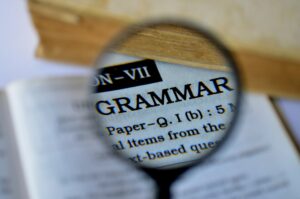by James Scott Bell
@jamesscottbell
 Remember when we used to call them “grammar schools”? The idea was to train the young in the foundational rules for communicating in our language, especially in written form. Such teaching has fallen on hard times. Fewer and fewer teachers are adequately trained or interested in the rules of grammar. The fallout can be seen everywhere, from schoolrooms to boardrooms, from books to blogs.
Remember when we used to call them “grammar schools”? The idea was to train the young in the foundational rules for communicating in our language, especially in written form. Such teaching has fallen on hard times. Fewer and fewer teachers are adequately trained or interested in the rules of grammar. The fallout can be seen everywhere, from schoolrooms to boardrooms, from books to blogs.
If this slide continues, what will we be left with? Grunting, I suppose. We could end up communicating like the monster in Young Frankenstein:
In years past, all journals and newspapers had crusty editors who were deeply grounded in rules of style and grammar, and could train their cubs to be more precise and understandable. But this species of grammarian has largely died out. And with the onset of digital and instant media, the flubs are flowing more freely than cheap beer at a bowling alley wedding.
Now, I’ll be the first to admit I’m no grammar expert. Unless I’m reminded, I don’t know a gerund from Geritol. To me, conjugation sounds like what prison inmates get when their wives visit. Nevertheless, I try to do service to the King’s English by regularly checking reference books like Write Right!
So allow me to cite a few examples of grammatical drift I’ve come across recently, mostly from “reputable” sites. They may seem innocuous now, but they’re like pebbles that precede a landslide. Let us watch our wording lest we get buried under rocks of perpetual bafflement!
Apple have been focused on your point of sale dollars for hardware.
A verb has to agree with its subject. Apple is singular, so has is required.
He has been more prolific in his career than either Troy Aikman and Roger Staubach.
It’s either/or, not either/and.
Yet why does more than 1 billion devices worldwide, in all socioeconomic strata and often most dominant in emerging markets, only account for 6% of publishers’ sales typically?
Can you spot the error in this mangle of a sentence?
The best hope for conference chaos this Fall after the Big Ten canceled football season lied with Ohio State.
Hoo boy. The lie, lay, lied, laid distinction is one of the trickiest in our language. I confess it confuses me still. But it doesn’t take an English degree to sense that lied is wrong. What to do? Consult a stylebook, or find an online explanation like this one that explains the differences.
Another editorial judgment is whether to just rewrite the sentence for greater clarity. In this case, I would. First off, is the writer saying people “hope” for “conference chaos”? Or is the gist of the thought that a hopeful end to the chaos would come via Ohio State?
I suspect it’s the latter, and if so the main thought of the sentence is deflated somewhat by its structure. We need a rearrangement and a comma. And we don’t need that big capital F jumping out at us in the middle. (Almost always, a season should be lowercase. How do I know? I looked it up!)
I would recast the sentence thus:
After the Big Ten canceled football season, the best hope for ending conference chaos this fall was Ohio State.
Instead, Costas had to take a pop shot at one of the sports he helped cover for a large part of his 38-year career at NBC Sports.
Did Costas throw a can of soda? Or was this a potshot (one word), an off-hand critical remark?
How Zoom’s new features will fair in the video conferencing landscape.
One wonders how Zoom can put up a Ferris wheel and sell cotton candy in a conferencing landscape.
They’ve heard the writing on the wall.
A neat trick!
We have to tip your hat to them.
I’ll do what I please with my own hat, thank you very much.
Now the FBI goes to work pouring over surveillance videos.
Pouring what? Coffee? Won’t that hinder the investigation? I’ll need to pore over more articles to figure out what they’re doing.
We were all waiting with baited breath.
I wonder what they baited their breath with? I’ve tried anchovies, but my wife objects.
In the absence of editors, what’s a writer in a hurry to do? (Here I’m distinguishing articles and the like from novel-length books, where we do have more time for beta readers and editors. See also Terry’s excellent self-editing tips.)
I know there are digital grammar apps, like Grammarly, that might help. Most of them require a subscription and I’ve heard they’re not 100% accurate. At least you should take the time to check your doc with Word’s spelling-and-grammar tool, and listen to your document via text-to-speech.
Words and how they sound are our bread and butter. So don’t jam up the works with clunky grammar. That’s just not fare to our readers, who tip our hats to us.
